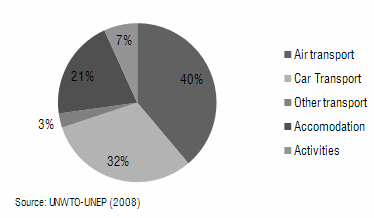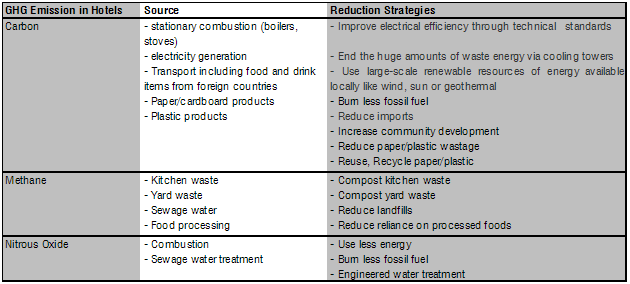With its close connections to the environment and climate itself, travel and tourism is considered to be a highly climate-sensitive economic sector. Thus, the sector is highly vulnerable to the effects of global warming and climate change which affects not only the geography of the earth but also has social, environmental and economic implications. Closer to home, it affects global tourism patterns and activities and demands adaptation by all tourism stakeholders, including hospitality. At the same time, the sector is also a contributor of greenhouse gas (GHG) emissions that trap solar heat in the atmosphere, partly in the same way as glass traps solar heat in a sunroom or a greenhouse, resulting in increased global temperatures and climate change.
The overall levels of economic activity and industrialization are important determinants of GHG emissions, which have grown since pre-industrial times with an increase of 70% between 1970 and 2004. GHGs include Carbon dioxide (CO2) that results from such activities as deforestation (for making paper amongst others) and the burning of fossil fuels like coal, oil, and gas during transportation and power generation. Other GHGs include methane, nitrous oxide and chlorofluorocarbons (CFCs). Since, tourism – including airlines and hospitality – relies heavily on activities that draw on huge natural reserves and result in emissions (Exhibit 1) , this article discusses strategies to conserve resources and mitigate GHG emissions, particularly for hospitality.
Exhibit 1: CO2 Emissions from Global Tourism – 2005

Strategies for Environment Responsive Solutions for Hospitality
Energy Management: The hospitality sector is a huge consumer of energy and thus adds GHG emissions directly through carbon emissions. Carbon is mainly contributed from burning of fossil fuels in such processes as energy generation, heating and cooling, electricity, transportation, and importing products over long distances. Burning of fuel at high temperatures also releases Nitrous oxide, a powerful GHG (300 times more powerful than carbon dioxide over a 100-year term) due to its efficiency at trapping infra-red radiation. CFCs – the life blood of refrigeration and air conditioning equipment – are well-known ozone depleting substances, which lead to an enlarging hole in the earth’s atmosphere thereby increasing the UV radiation reaching the earth’s surface and leading to a number of health conditions including skin cancers. CFCs also contribute to the 'greenhouse' effect as they absorb infra-red radiation from the earth's surface. Some methods for managing energy in hotels are::
- Reduction in energy consumption by exploiting all technical potential for electrical efficiency via technical standards; for example replacement of incandescent bulbs by compact fluorescent lights (CFLs), which use less energy and last eight times longer (8,000h instead of 1,000h).
- Replacement of old equipment with energy efficient ones.
- Regular maintenance of equipment to contain any leaks.
- Reduction in cogeneration of energy that usually goes waste such as in operations of cooling towers or utilizing this energy simultaneously for other processes.
- Replacement of fossil energy sources with renewable ones available locally such as wind or sun.
- Phase out of CFCs in refrigeration products and replacement with internationally accepted agents.
Solid Waste Management: The hospitality sector produces large amount of waste. An average restaurant produces 22,727 kg of garbage a year. Every night, the average diner produces about 1 kg of waste, mostly composed of beverage and paper products, accounting for 65% of all hotel waste. About 95% of this can be recycled or composted, but most is simply thrown away. Logging and burning of tropical forests for making paper and clearing land for agriculture creates about 20% of GHG emissions, more than that emitted from the world’s transportation. Hotels also use large quantities of plastic in packaging and amenities, which poses a problem in disposal as this takes up landfill space and takes hundreds of years to break down. Since waste has to be paid for twice - once in the form of packaging and again for disposal - it makes good business sense to create as little as possible in the first place. Not treating waste and diverting it to landfills produces methane emissions; methane is 21 times more powerful than CO2 as a GHG. Specific methods for a good waste management plan in hotels include:
- Reduction in use of virgin paper/paper products and increased use of recycled paper. Twenty cases of recycled paper substituted for non-recycled paper save 17 trees, 390 gallons of oil, 7,000 gallons of water, and 4,100 kWh of energy.
- Reduction in use of virgin plastic/products and increased use of recycled plastic/other packaging material.
- Recycling all waste material in the hotel including paper, glass, metal, plastic, and textiles. An aluminum can saves energy to run a television set for three hours.
- Composting yard and kitchen waste that can then be used as manure or gas.
Table 1. GHG Emissions in the Hospitality Industry: Sources and Reduction Strategies

Water Management: Water is a very expensive commodity in hotels as a large amount of it is obtained from private tankers and thus paid for. It is estimated that by 2010, water use will increase to approximately 475 gallons per day for each room in high luxury facilities. At the same time, water availability is projected to decrease in 30% of the world’s rivers as climate change leads to reduced availability of freshwater (less than 3% of the world’s water) and groundwater. With reduced water supplies and increased water demand, water conservation becomes a must.
Compounding the issue of water conservation is the release of GHGs such as methane (CH4) and nitrous oxide that are emitted during wastewater transport and sewage treatment. Water management methods in hotels include:
- Water-efficient technology, like low-flow showerheads and taps fitted with flow restrictors, which reduce water wastage.
- Rainwater harvesting, which utilizes rainwater from the roofs to supply water for toilets, laundry and gardening, minimizing wastage of rainwater.
- Greywater system, which treats water with low pollutants from sources like the laundry room, sinks and showers and then diverts it for other uses like watering of gardens.
- Engineered wastewater treatment, which reduces production of GHGs.
Employee Education and Community Development: Since hotels draw on environmental resources and climate change is primarily a result of human activities, it is crucial that people/ staff in hotels understand their role in how resources can be conserved and GHG emissions mitigated. Mitigation is truly possible when employees manning the operations understand the need for change, believe in it, and adapt their practices.
Hotels, by their very nature, draw on huge environmental resources and depending on the positioning have high luxury standards. Hotels have to balance out the luxury coefficient of their operations with that of their impact on the environment and adapt accordingly. For example, importing expensive items increases the carbon emissions (due to transportation) and costs, while an understanding with the community or a corporate social responsibility (CSR) project may actually lead to procuring the same item at lowered costs to both the hotel and environment as well as development of the local community.
Specific employee education and community development methods in hotels include:
- Commitment to the environment through the complete employee spectrum.
- Standard operating procedures of the hotel to include correct practices regarding different departments.
- Target setting, and involving/ encouraging employees to meet them.
- Training staff on issues related to the environment such as GHG emissions, water shortage, energy and the initiatives taken by the hotel regarding these.
- Community development with the participation of surrounding communities, suppliers and service providers, promoting the economic, social and cultural growth in the region.
- Greening the supply chain, which involves either purchasing from firms that are equally environment responsive or setting clauses that result in efficient practices.
In addition to the above practices that focus on the operational aspects of hotels, developers of new hotels can further reduce the environmental effect of their hotels from conception itself that is, the design stage to the materials used in construction. Hotels are built to last, literally, a lifetime and hotel owners should ensure their hotels are constructed using environment-friendly products and have a design that minimizes the usage of resources. Owners and management companies of hotels should ensure that their buildings and processes are duly certified and improvements incorporated wherever possible. Not only does bringing about these changes help improve the bottomline, but they also help the topline by attracting an ever-increasing number of environmentally sensitive customers.
While hotels can implement many environment-friendly features themselves, hospitality is moving increasingly towards a proactive mode in which the systems and processes can be managed more effectively and efficiently with least environmental impact. In doing so, many businesses are seeking third-party validation of their efforts instead of adopting ad hoc procedures. The ECOTEL® Certification, managed by HVS, is one such accredited third-party auditing agency that enables hotel operators to function more economically, efficiently, and as socially responsible entities while reducing the environmental impact of their hotels. The ECOTEL® methodology for certification includes all the above discussed areas of conserving resources and mitigating GHG emissions. It evaluates a hotel’s systems, processes and practices for environment friendliness through a stringent assessment of its range, scope and results across five crucial parameters, known as ‘The Five Globes’. These are: Environment Commitment, Solid Waste Management, Energy Management, Water Management, and Employee Education and Community Involvement.
Moreover, ECOTELs have consistently demonstrated through a focused effort on reducing waste generation and increasing operational efficiencies that ‘going green’ is also good for the bottomline and makes good business sense. Thus, the ECOTEL Certification enables sustainable solutions for hospitality.
For further information please contact [email protected] or visit www.ecotelhotels.com.

Dear Madem , Employee Education and Community Development: Nothing can be done till we start learning procedure at grass root level Sustainable hospitality management subject should be added in all hotel management and catering course. By enhancing sustainable hospitality education opportunities for all hotel management institutes students will learn and ensure the long -term sustainability of the global hotel industry. The Sustainable Hospitality Management course focuses on sustainable hotel strategies and innovations. Please visit our web site www.greenhotelnews.info www.greenhotelindia.in Kisholoy Gupta, Sustainable Hospitality Management Adviser